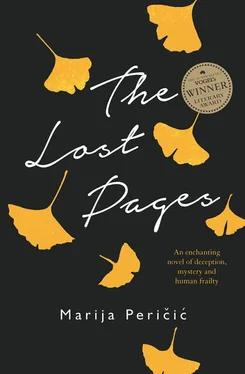I could see from the head of the stairs that the double doors to the living room were folded back and Uta’s voice reigned. Perhaps I could just walk past, I thought, and no one would see me. I held on to the bannister to lighten my step, and proceeded down the stairs slowly, but the top stair still gave a loud creak, alerting Uta.
‘Max?’ came her voice.
I froze, still clinging to the bannister, and my heartbeat light and fast. There came a dense rustling of fabric and Uta appeared in the doorway of the living room.
‘My darling!’ she shouted up at me, making a stiff operatic gesture with one hand. She advanced.
My eyes darted around, looking for a way out. I wondered if it were possible for me to simply dodge her and run out of the room, out of the house. Her bulk blocked the stairwell. She climbed up a few steps.
‘Your face,’ she said when she stood a few steps below me, looking up. ‘His face!’ she called back to the room she had just left. ‘His face is white! Like a ghost.’
She darted forward to seize my arm and escorted me into the living room. There was quite a crowd. Along with Sophie and my parents were Felix and Kurt, and Oskar—the cousin from Brünn whose letter I had read that morning—together with his wife. There was no escape.
I let myself be propelled into the middle of the sofa, where I slumped, dazed. Someone handed me a cup of coffee. Its warmth was welcome in my hands, but when I brought it to my face the smell that rose up with the steam was like poisonous fumes. I abruptly put down the cup and spilled coffee over my shoes and trousers. It burned at first, and was quite painful, but then rapidly cooled. People jumped up and called for towels and cloths but I just sat and watched the brown stain widen into the carpet and drip from my shoe leather.
In our family, what we call ‘magazines’ [19] The birthday ‘magazine’ to which Brod refers has been located among the manuscripts, and will be made available online.
are a tradition. For each family occasion we join together and take various kinds of submissions to assemble a little book, filled with poems, spoof newspaper articles and caricatures of the person who is being celebrated. I had always dreaded these magazines when it was my turn to receive them. I imagined the conversations among my family members when it was being assembled, and all the things that were not said as they carefully sifted through safe subjects to tease me about.
I could see my birthday magazine was sitting, ostentatiously wrapped, among the cakes and fruit on the table. When it could be avoided no longer, I took it down and unwrapped it. Everyone was watching me expectantly. The cardboard cover was overlaid with chequered fabric and covered with designs of cut-out felt figures.
Someone—probably Sophie, I thought—had spent a lot of time on it. Uta exclaimed loudly and craned her neck the better to see it. I opened it to the first page with a feeling of foreboding. The eyes of the room were on me, watching me for my reaction.
The first few pages were quite harmless, with a sketch by my mother and a spoof newspaper article written by Sophie. There was also a little poem, gaudy and overblown, which I thought must be from Felix. On the following page was a drawing in dark ink, which at first I could not identify. The heavy lines suggested a kind of haystack blown by the wind. I glanced around at the faces of the guests and saw that Oskar was nodding encouragingly as though the drawing were his. When my eyes found the paper again, the lines had resolved into the figure of a hunchback, clutching a swooning damsel in one hand; Quasimodo rescuing Esmeralda. Everyone was looking at me.
I cleared my throat, but could think of nothing to say. ‘Quite a resemblance,’ I managed after a moment. My voice sounded very loud in the room. Everyone’s eyes had been fixed on me, but now they bounced away in shame.
‘Quasimodo,’ Sophie said by way of explanation, ‘is a man of gentle heroism and a pure heart. Like you, Max.’
I found the truth of this comment to be negligible, but poor Sophie’s face radiated such concern that I tried to smile at her.
‘He is quite like you, Max,’ Uta broke in, examining the drawing. ‘Very like.’ There was a silence. ‘That muscular back, those strong hands.’ Her faltering voice crashed around the room and then dropped away, and no one filled the emerging silence.
I turned the page and everyone exclaimed and laughed too loudly over the next piece, a long ballad that recounted my achievements of the year in the style of a heroic saga.
After the ordeal of the magazine was over I wanted nothing more than to retire to my room. My body felt frayed and ragged and at the back of my mind the problem of Anja’s letter called for my attention. I could feel the sharp edges of the paper in my pocket, and it crackled with every movement I made. More cake was passed around and then Oskar came and sat beside me on the sofa. He seemed wholly unaware of having caused any offence with his drawing; on the contrary, he thought it was a great joke, and was, moreover, pleased with himself at having surprised me with his attendance at the party. The long letter I had read that morning had been a carefully designed ruse to make me unsuspecting of his visit.
He asked me familiarly what I was working on, and then without waiting for me to reply told me that he had heard that I was helping Franz write a travelogue and wondered what it was like to work with such a celebrated writer. I was too tired to do anything but nod. I was lucky, he said, to have the support of such a well-known literary figure. I just nodded. Yes. Very lucky.
There was no escape. From the corner of my eye I could see Uta hovering a short distance away, waiting for the moment she could break into the conversation. I looked at her and felt a great weariness. Her face was fat and shiny and framed by her frilly pink collar and yellow hair. She was my fate; perhaps there was no reason to continue to struggle. I thought of Oskar’s drawing and I imagined the life of Quasimodo in that church, ringing the bells and, dog-like, feeling only devotion. I had never read the novel, afraid that I would recognise in it a too-accurate portrait of myself, but somehow, despite this, the story had still filtered through to my awareness. That afternoon, in the overheated room filled with the cloying smell of oily pastries and close bodies, loud laughs and voices echoing from the walls, a solitary life in a damp church or upon some mountaintop seemed an idyll beyond imagining.
Oskar was still speaking to me, but I had stopped listening to him long ago. Now I turned and smiled at Uta and she joined us on the sofa. Uta and Oskar’s voices issued from their mouths and rose up into the air, like sticky condensation that adhered to the surfaces of the room and the skin on my face. I was much too tired to think now of anything except lying down, and fortunately my illness was a ready excuse for me to soon retire to my room.
THAT NIGHT, DESPITE MY FATIGUE, I COULD NOT SLEEP. I LAY ON my bed and looked at the patterns that the light from the streetlamp made on the ceiling and the walls of the room. I had put the letter on my night table, where it glowed like a little moon. As I lay there, my head full of night-time terrors, the awful thought came to me that Franz might be in Berlin with Anja. Perhaps it had been he, gloating, who had asked her to send me the stories. I thought of the house in Berlin, its thick walls enclosing the bodies of Franz and Anja. I found that at first I could consider this horror with a degree of equanimity, but the more I pictured it, the more uncomfortable I became. The thought that they could be, at that very moment, in the unknown house, living, breathing, perhaps sleeping, perhaps reading, was as strange and awful as considering the unknowable details of one’s own death.
Читать дальше












